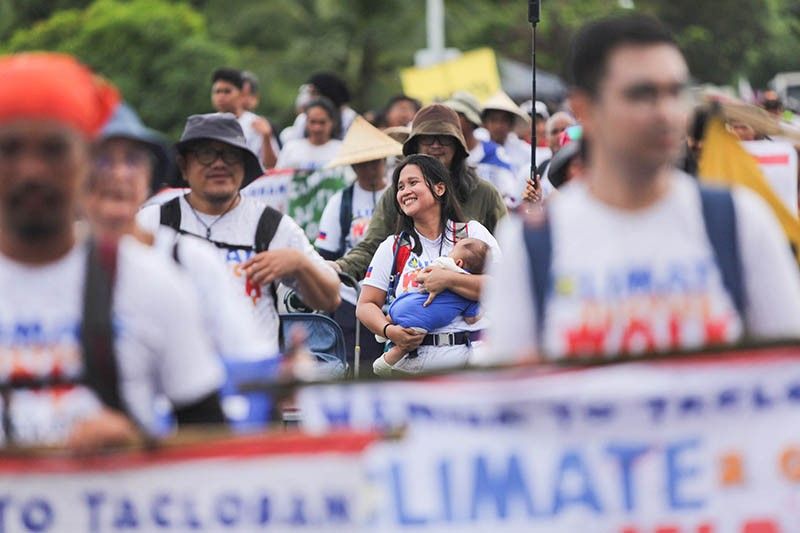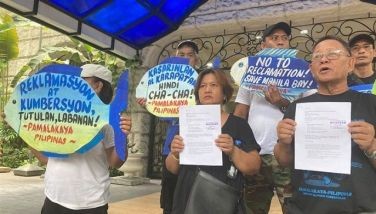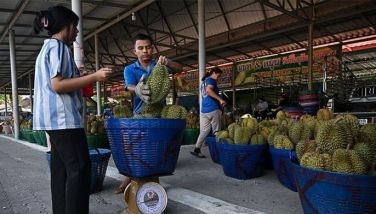‘Hopeless, but hopeful’: Yolanda survivors continue fight for climate justice a decade later

MANILA, Philippines — Joanna Sustento sometimes feels hopelessness and despair. The 32-year-old Taclobanon lost most of her family when Super Typhoon Yolanda, also known as Haiyan, devastated the Eastern Visayas city on Nov. 8, 2013.
For a decade, Sustento has been speaking about her harrowing experience in many climate events, including major conferences, and calling on big businesses and governments to compensate communities hard-hit by climate disasters and take urgent and ambitious action to combat the climate crisis.
Yolanda, one of the strongest storms ever recorded, killed more than 6,000 people and forced millions into displacement. It humanized an issue largely clouded by complex science and served as a warning of the catastrophic impacts of climate change.
“It’s really frustrating because I and our community, we’ve been sharing our stories for so long. We’ve been shouting, demanding climate justice for so long. And at the same time, we’re experiencing more extreme weather events, and still, nothing changes,” Sustento told Philstar.com.
Even before Yolanda, climate-vulnerable communities have been demanding climate justice—that wealthy countries, responsible for most of the carbon emissions that drive the crisis, owe them financial and technological assistance. Countries that are least responsible for the crisis, such as the Philippines, bear the brunt of the impacts of climate change.
But rich economies fail to deliver on the $100 billion promised each year.
Fierce debates on which countries should shoulder the “loss and damage” of climate disasters and which should benefit from it as well as abandoning fossil fuels continue even as climate scientists warn that devastating climate impacts are hitting faster than expected.
“Corporations still continue with business as usual, despite our calls for accountability, despite our calls for just transition. Even governments remain complacent. They do not uphold their duties to us, the people,” Sustento said.
Long fight
Ronan Napoto, a climate advocate from Quinapondan in Eastern Samar, also feels frustrated by the inaction of governments and corporations. Napoto said his community still struggles to cope with the aftermath of Yolanda a decade later.
“How many more years should we wait before achieving climate justice?” the 25-year-old Napoto asked.
“I always think that I don’t have the luxury of time. I don’t have enough resources to keep on campaigning for this call… I will not stay young as I am now,” he added.
A study published in The Lancet in 2021 found that more than half of 10,000 young people in ten countries, including the Philippines, reported feelings of sadness, anxiety, powerlessness and helplessness about the climate crisis.
Being a climate advocate can also be dangerous in the Philippines, which has consistently ranked as the worst place in Asia for land and environment defenders.
Despite the continuous threats to their lives and advocacy, lack of resources, and the feeling of being unheard, Napoto said that climate activists like him do not have any choice but to be hopeful. The stories and the eagerness of communities to fight keep him going.
“I would like to be still hopeful that at the end of the day, there’s still light at the end of the tunnel. I don’t know how long the tunnel is, though,” he said.
What climate justice should look like
Sustento and Napoto dream of a future where communities no longer live in fear and run away from storms, where authorities no longer have to count bodies after a disaster, where people feel safe and prepared.
For this future to happen, they stressed the need for governments to come up with people-centered solutions, transition to cleaner renewables in an equitable manner, and make polluters responsible for climate change pay.
“The funds that will be collected should be directed to initiatives that will support mitigation, and capacitate vulnerable communities to ensure that they just don’t just build back their lives, but they are also empowered [to adapt] to emerging issues,” Napoto said.
A landmark report of the Commission of Human Rights released in 2022 said that the willful obfuscation of climate science and obstruction of efforts toward global transition to clean renewable energy by fossil fuel companies are immoral. The commission also stressed that fossil fuel firms and governments have moral obligations to address the climate crisis.
President Ferdinand “Bongbong” Marcos Jr. has frequently mentioned the need to fight climate change and for rich nations to fulfill their climate obligations. But groups criticize him for failing to translate his words into tangible action.
Perseverance amid hopelessness
When Sustento started campaigning for climate justice and action, she was doing it for her parents, brother, sister-in-law and three-year-old nephew that she lost in the storm. She said she “wanted to honor their death” by starting a new life out of her loss.
Her purpose has evolved over the years after immersing in different communities and hearing their struggles.
“I was already doing it for the communities that I meet,” she said.
Ten years after Yolanda, Sustento found a new reason to continue her fight for climate justice: her son.
“I am no longer responsible just for myself. I’m responsible for someone else’s life,” the first-time mother said.
“When my son reaches an age where he can understand what’s happening in the world, I want to tell him the story of what I did to secure his future, to ensure that he’ll be able to reach his dreams when he grows up, that he’ll be able to have the best childhood, and enjoy the things I did when I was young,” she added.
Despite the overwhelming challenges, Sustento said she will not stop sharing her story. She hopes that those in the frontlines of the climate crisis will also find strength to keep telling their stories.
“Yes, we will get exhausted. But we can also rest. Let’s continue, Sustento said. “Telling our stories gives face to the climate crisis because this is the only way for the whole world to understand us.”
- Latest

























